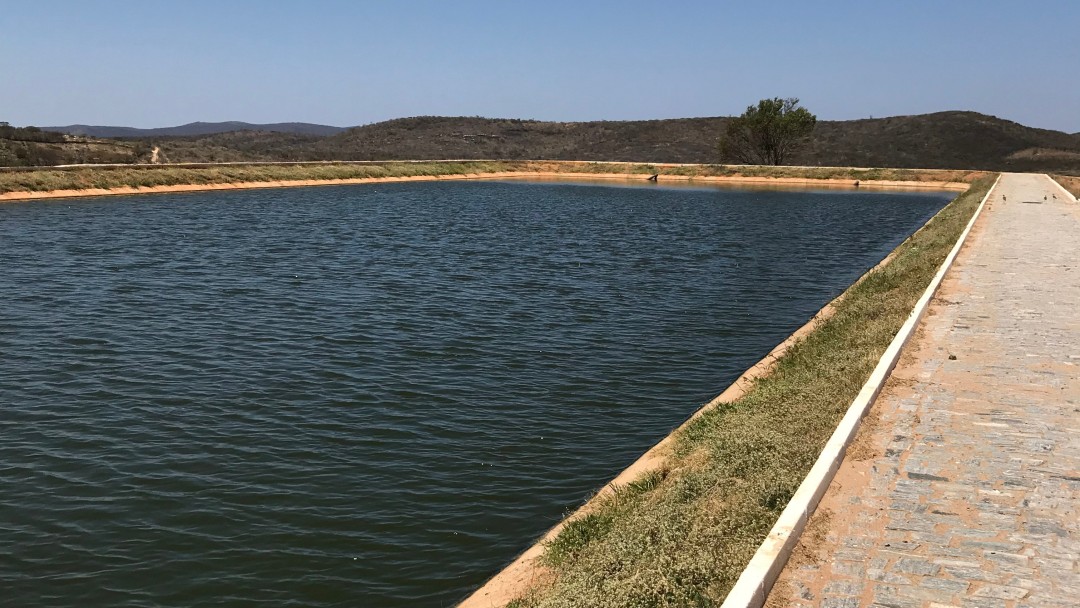News from 2021-10-11 / KfW Development Bank
Help for the arid North-East of Brazil
KfW supports basic sanitation on behalf of the German Federal Government and the EU

In the arid north-east of Brazil, water is a scarce commodity. KfW has already provided EUR 50 million on behalf of the German Federal Government in 2019 to improve water supply and sanitation in rural regions in the Brazilian state of Ceará. Now the European Union (EU) is supporting the project with a further EUR 7 million, which will benefit user associations. They will be advised on how to operate the supply systems in the long term and how to better manage resources.
Water is a valuable resource in the Brazilian state of Ceará, which is plagued by drought. The region is particularly poor in rainfall. Several drought years in a row have triggered a migration to the big cities. The situation is coming to a head: climate change will further exacerbate the drought in Ceará.
Besides the lack of water, the inadequate infrastructure, especially far from the cities, is a major problem. People in the rural regions of north-eastern Brazil often do not have a water connection in their homes, but get water from tank trucks. They store their supplies in canisters or open barrels, which leads to the spread of pathogens that can trigger dengue fever, for example.
Backcountry particularly disadvantaged
The inadequate disposal of sewage makes the situation worse. In the villages, sewage is not collected properly but disposed of untreated. This also causes many diseases. Only 64 percent of the state's inhabitants have an adequate water supply and only 25 percent have sewage disposal. The region with its nine million inhabitants is one of the poorest in the country. The average income is well below the national average. Poverty is even more widespread in the rural zones than in the state capital Fortaleza.
EU funds complement KfW loan
This is where KfW's project comes in, which has been supplemented since mid-October by an EU grant from the Latin America Investment Facility (LIF). While KfW, on behalf of the German Federal Ministry for Economic Cooperation and Development (BMZ), is providing EUR 50 million to support the construction and expansion of a water infrastructure, the EU funds are mainly used to advise the users who have joined forces and operate the installations. The aim is to ensure the most sustainable use of resources and smooth operation of the installations. The measures help to expand and renew the infrastructure. The existing water and sanitation infrastructure is often dilapidated, resulting in high water losses. Therefore, wells, elevated tanks and water treatment plants are to be built, as well as house connections. In addition, sewage collection networks, mini-treatment plants and drying beds will be created in order to clean and dispose of the sewage appropriately.
The project expands on several previous projects with which KfW has already contributed to improving basic rural sanitation in the Brazilian state of Ceará with funds from the BMZ. "We have been a partner from the very beginning," says KfW portfolio manager Sandra Soares da Silva. "With our long-standing commitment, we have not only financed infrastructure, but also helped the operators to become better organised." The operation framework has been continuously developed and has now reached a new level of quality.
Advice for sustainable management
In future, the EU funds will be used to provide advice to the operator associations (Sistemas Integrados de Saneamento Rural, SISAR) so that they can maintain the facilities in the long term, ensure quality and manage the bookkeeping. These are non-profit organisations in which representatives of the users have joined together. They receive support from the project funds for professional structures as well as for devices and equipment to better manage the supply systems. "Together with the EU, we can lay the foundation here for sustainable operation in the water and wastewater sector," says Sandra Soares da Silva.
Through an exchange of experience between the existing associations and with organisations in other federal states, the proven operating model is to be taken beyond local borders, as other federal states are also interested.

Share page
To share the content of this page with your network, click on one of the icons below.
Note on data protection: When you share content, your personal data is transferred to the selected network.
Data protection
Alternatively, you can also copy the short link: https://www.kfw-entwicklungsbank.de/s/enzBWrMC.CkiA
Copy link Link copied